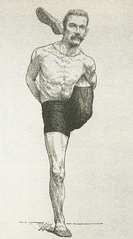This is RPG-ology #36: Phionics, for November 2020.
I was conversing with someone via messaging and he misspelled a word. I recognized what he meant, so I overlooked it—but it got me thinking.

The word he wanted was psionics, which had just been mentioned in our conversation, but he misspelled it phionics, which is probably more intriguing to me than to most of you because I do a bit of study in Greek, and I know that psionics comes, indirectly, from the Greek word psychos, which has several meanings but we usually take to mean soul, and it begins with the letter psi. We get a lot of words connected to the inner person from that, including psychology, psychiatry, psychic, and of course psionic. But in my mind he had replaced the psi with a phi, a different greek letter and the first letter in the word physis, which literally means natural but which is connected into our language with things that are physical, including physics and things that have to do with the body, like getting a physical or engaging in physical fitness.
So why not a category of special powers called phionics?
My first thought was the D.C. Comics joke hero Super Elastic Plastic Man, who could stretch his body in all kinds of crazy ways—and you could certainly go there if you wished. Yet we all know people who can bend and stretch in ways we find unthinkable. One of my sons from an early age would sit on the floor, lie forward, and put his chest and face against the rug between his legs and go to sleep like that. Now full grown and taller than my six feet he still sometimes puts his feet behind his head and walks on his knees. In terms of what people do, though, that’s out there. Do a Google images search for contortionist and you will see bodies that look as if they must have been sawn apart and glued back together.
And while these are certainly due to special talents and plenty of exercise, they are obviously all within the realm of humanly possible.
As with psionics, you can parcel these out in small doses—Martin Riggs in Lethal Weapon 2 can dislocate his shoulder to escape from a straitjacket. The titular character in Kick-Ass feels no pain and so enhances his ability to take damage. You could go beyond these, with physical powers that seem supernatural such as the Iron Fist, or those which actually are impossible, such as the aforementioned rubber body.
In the original Advanced Dungeons & Dragons, psionics were rare gifts with which some characters were born (or perhaps otherwise accidentally obtained prior to the beginning of the game). In 2nd edition they became primarily techniques taught by masters in which individuals were schooled, working from the simpler, less potent, to the more powerful. With phionics, you could do either—or both. Just create a list of incredible through impossible body skills, and rank them from the simple to the amazing.
So here’s a short list to get you started:
- Hyper-flexibility: the character can bend and stretch in surprising ways, such as putting his feet behind his head, and so can fit through narrow spaces and such.
- Double jointed: Some of the character’s joints bend in unusual ways.
- Hardened musculature: the character can cause muscles in some part or parts of his body to become excessively hard, such that they can withstand blows or deal significant damage.
- Adrenal control: the character can give himself a brief boost of strength and/or speed.
- Disconnecting joints: one or more of the character’s joints can be disconnected, permitting the body to take a different possibly useful altered shape.
- Reduced pain response: the character’s ability to feel pain has been reduced or eliminated such that although he can be injured he does not feel it.
- Expanding ligaments: the character can stretch his arms and legs by expanding the joints while holding them together with stretched ligaments.
- Rubber body: the character can stretch and reshape his body in nearly any imaginable way without reference to bones.
Call it one more tool to enhance your game without using magic.
Previous article: Believable Nonsense.
Next article: It’s Greek to Me.
